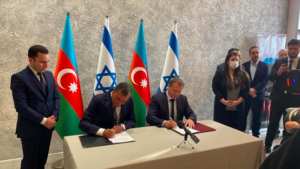By Jacob Kamaras

(JNS) With the latest wave of Palestinian terrorism, the tensions that surround the Temple Mount and the firestorm of unverified allegations against Israel that followed the death of Al Jazeera journalist Shireen Abu Akleh, the leadup to this year’s observance of Jerusalem Day on May 28-29 has been tumultuous.
Yet as they celebrate the 55th anniversary of the capital’s reunification, Israelis and Jews worldwide can draw inspiration and solidarity from the parallel experiences of another country and its people.
May 28 also marks one of the annual Independence Days celebrated in Azerbaijan, a South Caucasus nation and key Muslim-majority ally of Israel. This Azerbaijani national holiday is also known as “Republic Day”—the date in 1918 when the Azerbaijan Democratic Republic (ADR) became the world’s first-ever parliamentary republic with a majority-Muslim population. The ADR would fall to Vladimir Lenin’s Soviet Union only two years later in 1920, but Azerbaijan regained independence in 1991, an event associated with the country’s other Independence Day on October 18.
In more recent years, Azerbaijanis have had even more reason to celebrate the spirit of sovereignty. For 28 years, May 8 represented their solemn anniversary of the fall of Shusha—a city known as the “Conservatory of the Caucasus” due to its status as a significant political, economic and cultural center in the region—to Armenian forces. However, in its 2020 war with Armenia, Azerbaijan reclaimed not only Shusha but also the broader Armenian-occupied territory of Nagorno-Karabakh.
Since 1993, four U.N. Security Council resolutions had affirmed that Nagorno-Karabakh was internationally-recognized Azerbaijani territory. In addition, the U.S. State Department asserts that America “does not recognize Nagorno-Karabakh as an independent country” and “supports the territorial integrity of Azerbaijan.” The Armenian occupation of the region persisted for three decades until Yerevan’s surrender to Baku in a Russian-brokered agreement in November 2020. Today, “Nagorno-Karabakh” can be acknowledged as part of Azerbaijan not only in the words of international law, but also in practice—although Armenian separatists remain in the area in defiance of the 2020 agreement.

Azerbaijanis’ joy at the reclamation of Shusha mirrors world Jewry’s sentiments on the reunification of Jerusalem under Israeli control in 1967. Moreover, the world’s only Jewish state and the first secular democratic state in the Muslim east continue to blaze their respective trails in interfaith tolerance, despite the countless critics in the international community who claim otherwise.
For example, how is Israel accused of “apartheid” against Muslims and Arabs when Arab lawmakers not only serve in the country’s legislature, but in its coalition government? And how is Azerbaijan accused of a culture war against Christians when its government has restored Christian landmarks such as Baku’s Armenian cathedral, which now houses a library of some 5,000 precious Armenian manuscripts?
This hypocrisy also emanates from U.S. Rep. Rashida Tlaib (D-Mich.), the daughter of Palestinian immigrants who has just introduced a House resolution that called for American recognition of the “Nakba”— the Arabic word for “catastrophe” that Palestinians use to describe Israel’s establishment. While Tlaib is vehement in her opposition to the Israeli presence in Judea and Samaria, she supported the Armenian occupation of Nagorno-Karabakh before Azerbaijan reclaimed the territory in 2020.
Tlaib is not alone in this double standard on territorial occupations. Another example is Sarah Leah Whitson, former director of the Middle East and North Africa division of Human Rights Watch. A fierce critic of Israeli settlement construction, Whitson felt no compunction when she hosted a 2018 fundraiser for the Armenian National Committee of America, a lobby group that promotes the illegal Armenian settlement of internationally-recognized Azerbaijani territory.
Another Jerusalem Day will come and go, and Israel and Azerbaijan will both continue to be subjected to selective criticism and double standards. At the same time, the Israeli and Azerbaijani people—in line with their countries’ pioneering and multifaceted Jewish-Muslim alliance, which long preceded the Abraham Accords—have the opportunity to use May 28 to appreciate the modern-day miracles of their respective returns to Jerusalem and Shusha.
After the State of Israel was established in 1948, it took 19 more years to reunify Jerusalem. After Azerbaijan gained independence from the Soviet Union in 1991, but lost control of Shusha to Armenia in 1992, it took another 29 years to retake the cherished city. Yet today, for both Israelis and Azerbaijanis, the yearning is over. From Jerusalem to Shusha, May 28 is a day to celebrate reunification, reclamation and restoration.
*
Jacob Kamaras is editor and publisher the San Diego Jewish World, the former editor-in-chief of the Jewish News Syndicate, and the founder of Stellar Jay Communications, a PR firm representing Azerbaijan.
It is interesting how Armenians became collateral damage twice in just over a century when great powers and those with parallel interests have used nationalism for their congruent goals.
The first was during the leadup to WWI when the British and their supporters, to dismember the Ottoman Empire, needed to remove Islam as the centripetal force uniting the Empire’s varied Muslim ethnicities and replace it with senses of nationalism. A partial list includes T.E. Lawrence (of Arabia) to the Nili Group, Crypto Jewish Donme, and proto-Nazi Germans wanting Armenians to disappear, supporting radical Turkish nationalism. This ethnic “success” came at the expense of a million and a half Armenian murdered with the eventual “cleansing” of much of the Empire’s Greeks and Assyrians, serving rabid pan-Turanism. This process continues with anti-Syrian yet pro-ethnic Turkish operations across northern Syria.
Today, we have forces that wish to dismember Iran if it will not unilaterally end its nuclear program and much of its advanced delivery systems. Despite Erdogan’s anti-Semitic rants, Turkey is encouraged to serve an irredentist Pan-Turkic policy that pressures Iran, as well as Russia in Central Asia. NATO, the West, and Israel actively encouraged Azerbaijan’s capture of the historic Armenian-populated region of Nagorno-Karabakh in 2022. This support was not based on so-called internationally recognized borders (note: Israel’s silent annexation of Syria’s Golan Heights and NATO’s creation of Kosovo violating such tenets) but rather to encourage a sense of Turkic nationalist success. In this case, Azerbaijani nationalism hopes to spill over into Azerbaijani-speaking northwest Iran. Of course, Israel has enhanced its intelligence-gathering capabilities with the Azerbaijani capture of Nagorno-Karabakh and lands extending to the Iranian border.
Over four thousand Armenian young men lost their lives fighting an Azerbaijani war run by the Turkish General Staff. The author celebrates this accomplishment as “Muslim and Jewish allies standing together.”
Yerevan, Armenia